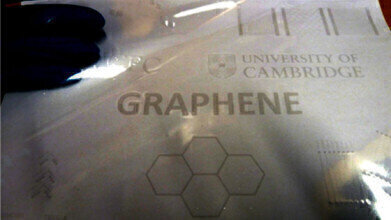-
 The image shows a printed graphene device. Credit: Andrea Ferrari.
The image shows a printed graphene device. Credit: Andrea Ferrari.
News & Views
Graphene: Taking the Wonder-Stuff from Dream to Reality
Feb 11 2013
A centre for research on graphene, a material which has the potential to revolutionise numerous industries, ranging from healthcare to electronics, has just opened at the University of Cambridge, with a dedicated facility due to open at the end of the year.
With the University already acting as a hub for graphene engineering, the objective of the new Cambridge Graphene Centre is to make this “wonder material” work in real-life applications bridging the gap between academia and industry. It will also be a shared research facility with state-of-the-art equipment, which any scientist researching graphene will have the opportunity to use.
Activities at the Centre will be funded by a Government grant worth more than £12 million, which was allocated to the University in December by the Engineering and Physical Sciences Research Council (EPSRC). The rest of this money will support projects focusing both on how to manufacture high-quality graphene on an industrial scale, and on developing some of its potential applications.
Graphene, a one-atom thick layer of graphite, is exceptionally
strong, yet also lightweight and flexible; it enables electrons to flow faster than silicon and functions as a transparent conductor. The first job for those working in the Cambridge Graphene Centre will be to find ways of manufacturing and optimising graphene films, dispersions and inks so that it can be used to good effect.
Professor Andrea Ferrari, who will be the Centre’s Director, said: “We are now in the second phase of graphene research, following the award of the Nobel Prize to Geim and Novoselov. That means we are targeting applications and manufacturing processes, and broadening research to other two-dimensional materials and hybrid systems. The integration of these new materials could bring a new dimension to future technologies, creating faster, thinner, stronger, more flexible broadband devices.”
The Government funding for the Centre is complemented by strong industrial support, worth an additional £13 million, from over 20 partners, including Nokia, Dyson, Plastic Logic, Philips and BaE systems. A further £11M of European Research Council funding will support activities with the Graphene Institute in Manchester, and Lancaster University.
Further information on www.cam.ac.uk/research
Digital Edition
Lab Asia 31.2 April 2024
April 2024
In This Edition Chromatography Articles - Approaches to troubleshooting an SPE method for the analysis of oligonucleotides (pt i) - High-precision liquid flow processes demand full fluidic c...
View all digital editions
Events
Apr 28 2024 Montreal, Quebec, Canada
May 05 2024 Seville, Spain
InformEx Zone at CPhl North America
May 07 2024 Pennsylvania, PA, USA
May 14 2024 Oklahoma City, OK, USA
May 15 2024 Birmingham, UK





.jpg)











